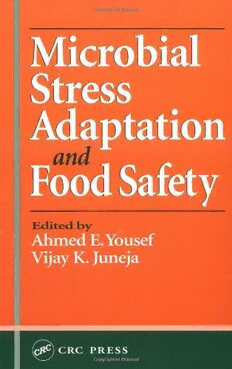
Microbial stress adaptation and food safety PDF
358 Pages·2003·2.59 MB·English
Most books are stored in the elastic cloud where traffic is expensive. For this reason, we have a limit on daily download.
Preview Microbial stress adaptation and food safety
Description:
The first book to address the subject, Microbial Stress Adaptation and Food Safety emphasizes the implications of stress adaptation and its consequences for food safety. It covers the basic science, kinetics, mechanisms, assessment, and control of stress adaptation and its impact on the safety of foods produced by minimal processing or non-thermal technologies. World renowned experts in the field provide detailed accounts of problems associated with stress adaptation and suggest methods for overcoming these problems.The book begins with an introduction to the stress adaptation phenomenon and its implications for the safety of food processed by novel technologies. Then it addresses the responses of pathogens to physical and chemical stresses encountered during food processing, such as heat, pressure, dehydration, radiation, added organic acids, and naturally occurring antimicrobials. The adaptation of food microbiota to stress as a survival strategy is covered next, followed by an examination of the broad spectrum of stresses that may increase a pathogen's tenacity and resistance to processing.Other topics include stress adaptation of beneficial lactic acid bacteria and how resistance or adaptation to stress in the processing environment relates to pathogens' ability to cause disease. Finally, the book presents strategies to overcome stress adaptation in foodborne pathogens. The authors suggest practical control measures and emphasize the need for future research to counteract the stress adaptation phenomenon.Microbial Stress Adaptation and Food Safety proposes practical solutions to microbial stress adaptation and its hazardous effects on food safety and human health.
See more
The list of books you might like
Most books are stored in the elastic cloud where traffic is expensive. For this reason, we have a limit on daily download.
